牛津译林版(2019)选择性必修第一册 Unit 2 The Universal Language Grammar and usage 课件(32张PPT含视频)
文档属性
| 名称 | 牛津译林版(2019)选择性必修第一册 Unit 2 The Universal Language Grammar and usage 课件(32张PPT含视频) | 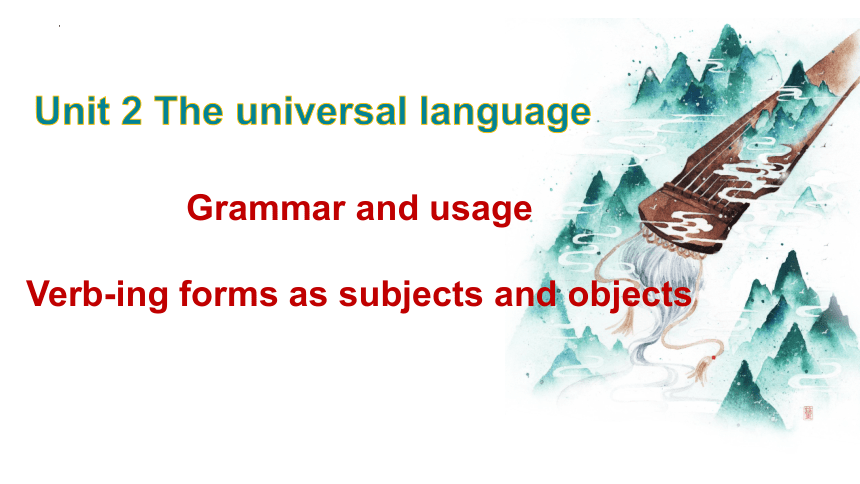 | |
| 格式 | zip | ||
| 文件大小 | 82.0MB | ||
| 资源类型 | 教案 | ||
| 版本资源 | 牛津译林版(2019) | ||
| 科目 | 英语 | ||
| 更新时间 | 2022-12-30 10:47:37 | ||
图片预览

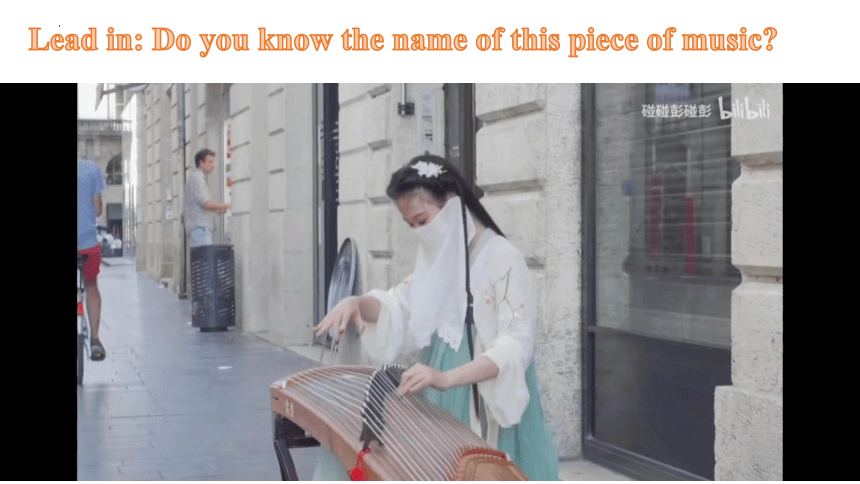
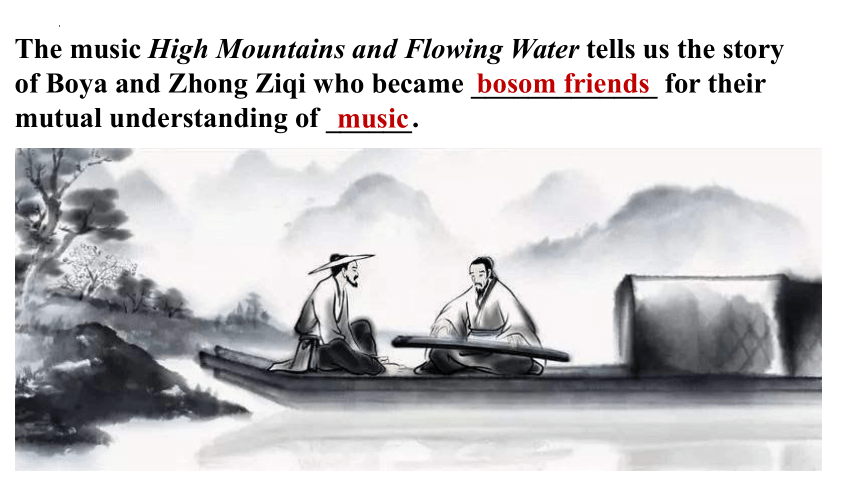
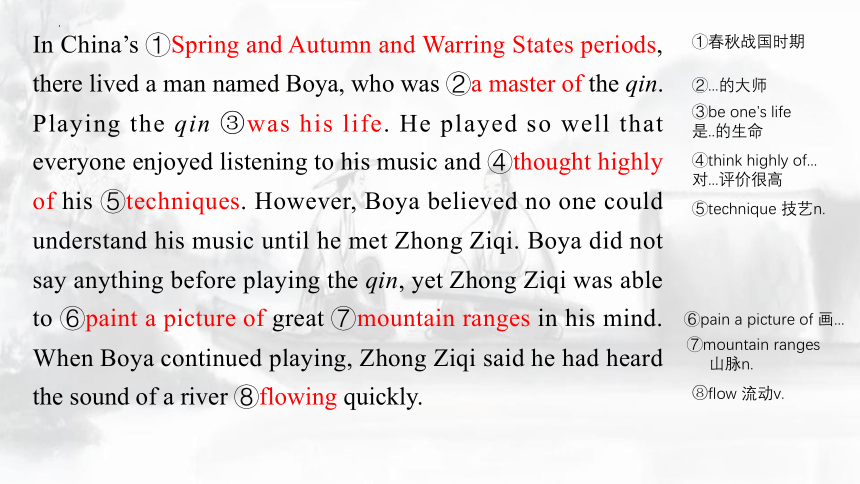
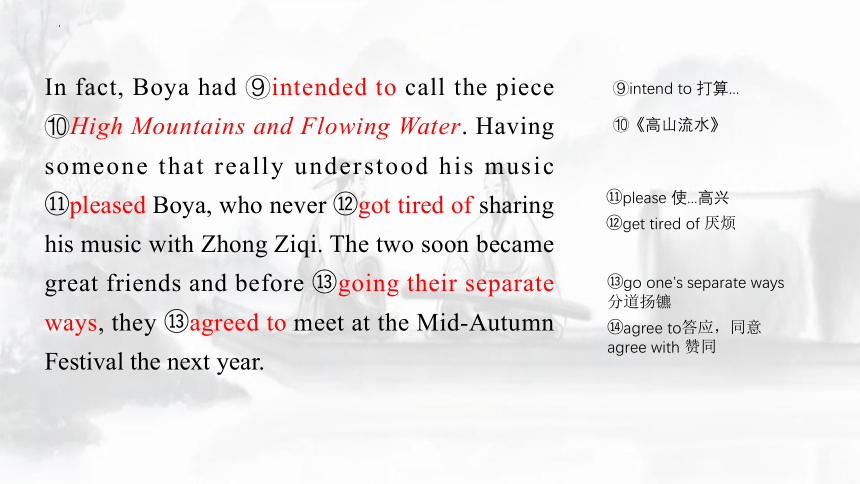
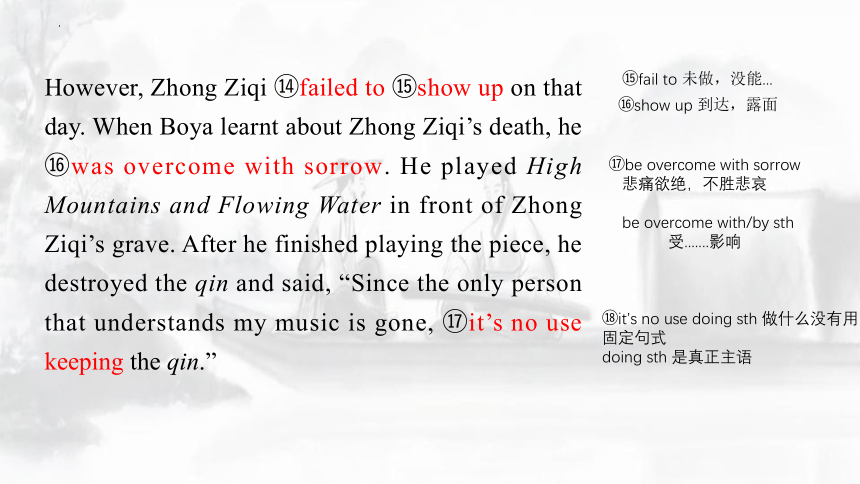
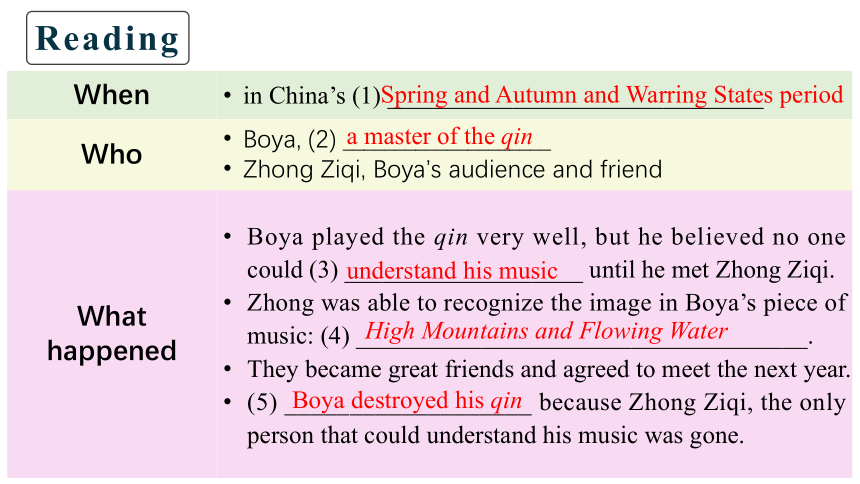
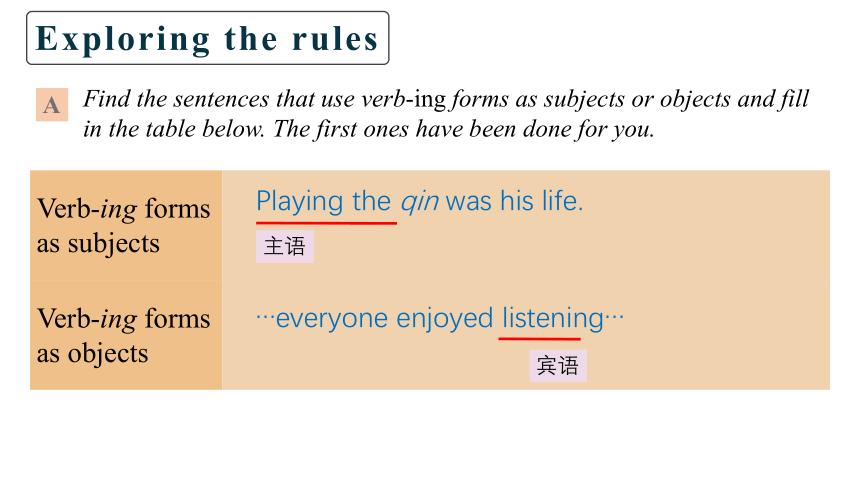
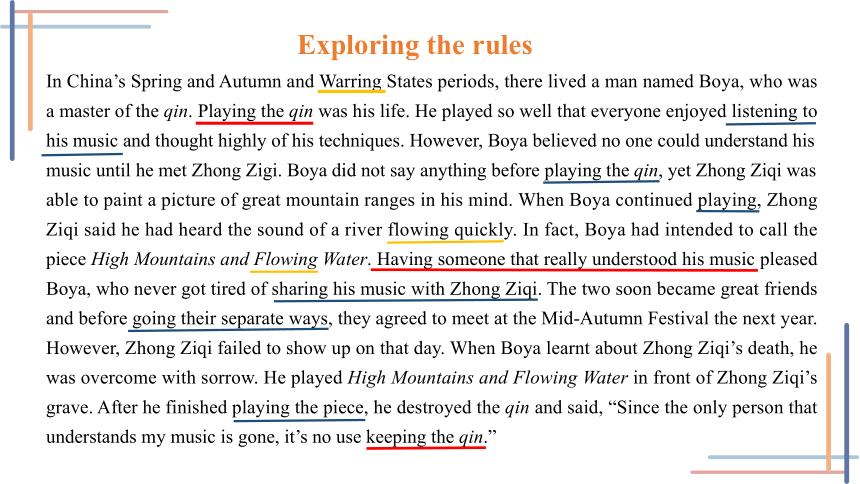
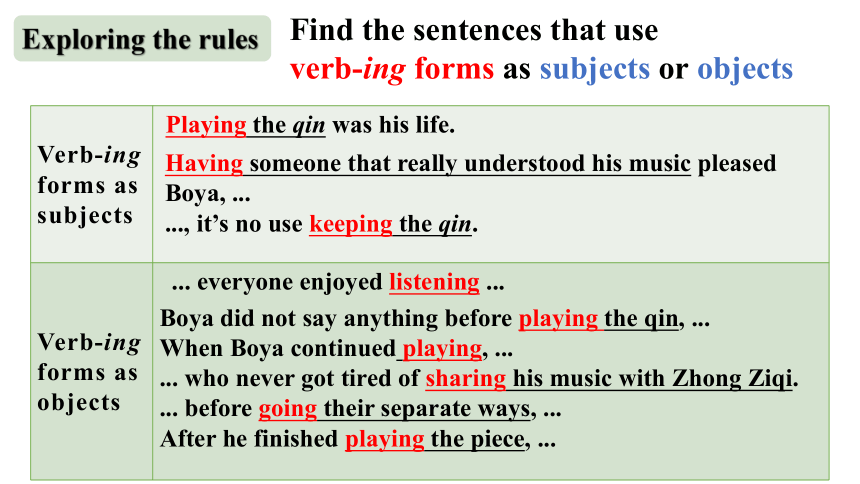
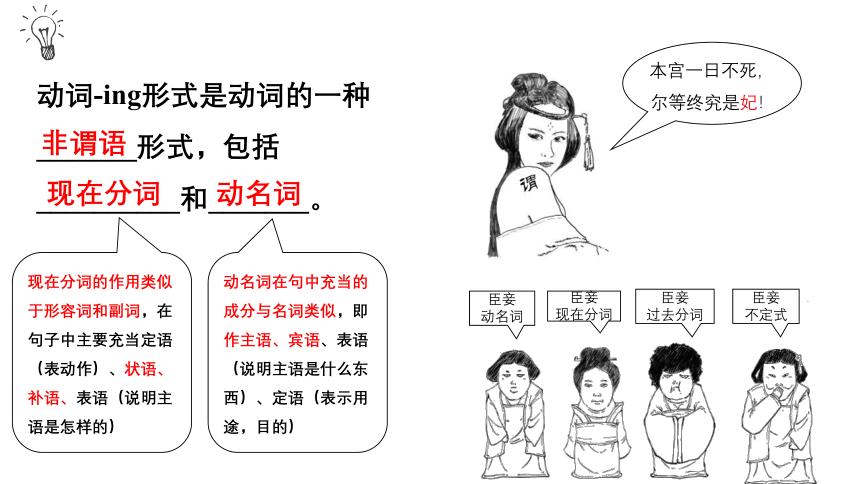
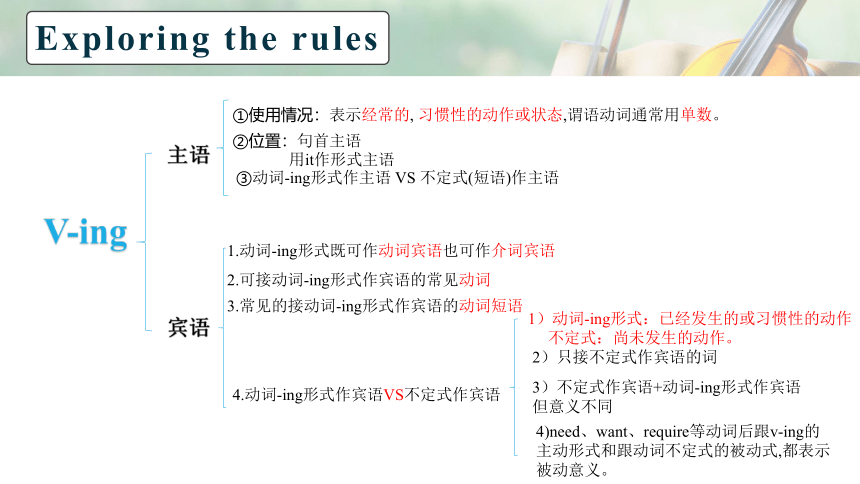
文档简介
(共32张PPT)
Grammar and usage
Verb-ing forms as subjects and objects
Unit 2 The universal language
Lead in: Do you know the name of this piece of music
The music High Mountains and Flowing Water tells us the story of Boya and Zhong Ziqi who became _____________ for their mutual understanding of ______.
bosom friends
music
In China’s ①Spring and Autumn and Warring States periods, there lived a man named Boya, who was ②a master of the qin. Playing the qin ③was his life. He played so well that everyone enjoyed listening to his music and ④thought highly of his ⑤techniques. However, Boya believed no one could understand his music until he met Zhong Ziqi. Boya did not say anything before playing the qin, yet Zhong Ziqi was able to ⑥paint a picture of great ⑦mountain ranges in his mind. When Boya continued playing, Zhong Ziqi said he had heard the sound of a river ⑧flowing quickly.
①春秋战国时期
②...的大师
③be one’s life
是..的生命
④think highly of...
对...评价很高
⑤technique 技艺n.
⑥pain a picture of 画...
⑦mountain ranges
山脉n.
⑧flow 流动v.
In fact, Boya had ⑨intended to call the piece ⑩High Mountains and Flowing Water. Having someone that really understood his music pleased Boya, who never got tired of sharing his music with Zhong Ziqi. The two soon became great friends and before going their separate ways, they agreed to meet at the Mid-Autumn Festival the next year.
⑨intend to 打算...
⑩《高山流水》
please 使...高兴
get tired of 厌烦
go one’s separate ways
分道扬镳
agree to答应,同意
agree with 赞同
However, Zhong Ziqi failed to show up on that day. When Boya learnt about Zhong Ziqi’s death, he was overcome with sorrow. He played High Mountains and Flowing Water in front of Zhong Ziqi’s grave. After he finished playing the piece, he destroyed the qin and said, “Since the only person that understands my music is gone, it’s no use keeping the qin.”
fail to 未做,没能...
show up 到达,露面
be overcome with sorrow
悲痛欲绝,不胜悲哀
be overcome with/by sth
受.......影响
it’s no use doing sth 做什么没有用
固定句式
doing sth 是真正主语
When in China’s (1) ______________________________
Who Boya, (2) ____________________
Zhong Ziqi, Boya’s audience and friend
What happened Boya played the qin very well, but he believed no one could (3) ___________________ until he met Zhong Ziqi.
Zhong was able to recognize the image in Boya’s piece of music: (4) ____________________________________.
They became great friends and agreed to meet the next year.
(5) ___________________ because Zhong Ziqi, the only person that could understand his music was gone.
Spring and Autumn and Warring States period
a master of the qin
understand his music
High Mountains and Flowing Water
Boya destroyed his qin
Reading
Exploring the rules
A
Find the sentences that use verb-ing forms as subjects or objects and fill in the table below. The first ones have been done for you.
Verb-ing forms as subjects
Verb-ing forms as objects
Playing the qin was his life.
…everyone enjoyed listening…
主语
宾语
In China’s Spring and Autumn and Warring States periods, there lived a man named Boya, who was a master of the qin. Playing the qin was his life. He played so well that everyone enjoyed listening to his music and thought highly of his techniques. However, Boya believed no one could understand his music until he met Zhong Zigi. Boya did not say anything before playing the qin, yet Zhong Ziqi was able to paint a picture of great mountain ranges in his mind. When Boya continued playing, Zhong Ziqi said he had heard the sound of a river flowing quickly. In fact, Boya had intended to call the piece High Mountains and Flowing Water. Having someone that really understood his music pleased Boya, who never got tired of sharing his music with Zhong Ziqi. The two soon became great friends and before going their separate ways, they agreed to meet at the Mid-Autumn Festival the next year. However, Zhong Ziqi failed to show up on that day. When Boya learnt about Zhong Ziqi’s death, he was overcome with sorrow. He played High Mountains and Flowing Water in front of Zhong Ziqi’s grave. After he finished playing the piece, he destroyed the qin and said, “Since the only person that understands my music is gone, it’s no use keeping the qin.”
Exploring the rules
Verb-ing forms as subjects Playing the qin was his life.
Verb-ing forms as objects ... everyone enjoyed listening ...
Having someone that really understood his music pleased Boya, ...
..., it’s no use keeping the qin.
Boya did not say anything before playing the qin, ...
When Boya continued playing, ...
... who never got tired of sharing his music with Zhong Ziqi.
... before going their separate ways, ...
After he finished playing the piece, ...
Exploring the rules
Find the sentences that use
verb-ing forms as subjects or objects
动词-ing形式是动词的一种
_______形式,包括__________和_______。
本宫一日不死,尔等终究是妃!
臣妾
现在分词
臣妾
过去分词
臣妾
不定式
臣妾
动名词
非谓语
现在分词
动名词
动名词在句中充当的成分与名词类似,即作主语、宾语、表语(说明主语是什么东西)、定语(表示用途,目的)
现在分词的作用类似于形容词和副词,在句子中主要充当定语(表动作)、状语、补语、表语(说明主语是怎样的)
Exploring the rules
V-ing
主语
宾语
①使用情况:表示经常的, 习惯性的动作或状态,谓语动词通常用单数。
②位置:句首主语
用it作形式主语
③动词-ing形式作主语 VS 不定式(短语)作主语
1.动词-ing形式既可作动词宾语也可作介词宾语
2.可接动词-ing形式作宾语的常见动词
3.常见的接动词-ing形式作宾语的动词短语
4.动词-ing形式作宾语VS不定式作宾语
2)只接不定式作宾语的词
3)不定式作宾语+动词-ing形式作宾语
但意义不同
1)动词-ing形式:已经发生的或习惯性的动作
不定式:尚未发生的动作。
4)need、want、require等动词后跟v-ing的主动形式和跟动词不定式的被动式,都表示被动意义。
Exploring the rules
动词-ing形式作主语
Going to Hangzhou by train takes about 16 hours.
Asking a woman’s age is impolite in his country.
表示经常的, 习惯性的动作或状态,谓语动词通常用单数。
Exploring the rules
动词-ing形式作主语
动词-ing形式直接置于句首主语的位置上
动词-ing形式作主语时常后置,用it作形式主语,用形容词或名词(短语)作表语。
It’s no use/no good/no fun/ a great pleasure/ a waste of time doing sth.
Saying is easier than doing. 说比做容易。
It’s no use making an excuse for this. 为这件事找借口是没有用的。
Practice
1. 继续等他没有用了。
2. 为那个计划争论简直就是浪费时间。
It’s no use waiting for him any longer.
It’s really a waste of time arguing about that plan.
3.It’s no use crying over spilt milk.
覆水难收
Exploring the rules
动词-ing形式作主语
动词-ing形式作主语 VS 不定式(短语)作主语
动词-ing作主语 Playing with fire is dangerous. 玩火危险。
不定式(短语)作主语 Be careful! To play with fire is dangerous. 小心点,玩火是危险的。
具体的或一次性的动作
泛指的行为
_________ (read) English aloud in the morning does you a lot of good.
He realized that __________ (go) on like this was no use.
Reading
to go
在实际运用中,两者一般可以互换,差异不大,但在下面这种情况不能互换:当表语是动词-ing形式时,主语也要用动词-ing形式;当表语是不定式时,主语也要用不定式。
眼见为实。
Seeing is believing.
=To see is to believe.
Exploring the rules
动词-ing形式作宾语
1.动词-ing形式既可作动词宾语也可作介词宾语。
翻译句子:
我还没读完今天的报纸。
我害怕去看牙医。
I haven’t finished reading today’s newspaper.
I’m afraid of going to the dentist.
2.可接动词-ing形式作宾语的常见动词:
“避免错过少延期(avoid、miss、postpone),
建议完成多练习(suggest、advise、finish、practise),
喜欢想象禁不住(enjoy、appreciate、imagine、can’t help),
承认否认与嫉妒(admit、deny、envy),
逃避冒险莫原谅(escape、risk、excuse)”。
You should avoid quarrelling with your younger sister.
你应该避免与你妹妹争吵。
3.常见的接动词-ing形式作宾语的动词短语有:
insist on、object to、lead to、look forward to、devote to、
get used to、pay attention to、get down to
4.动词-ing形式作宾语与不定式作宾语的区别。
She likes singing in her spare time.
We plan to gather more books for those children in the village.
1)一般来说,动词-ing形式表示习惯性的动作,而不定式表示尚未发生的动作。
2)只接不定式作宾语,常见动词口诀如下:
同意提出做计划(agree、offer、intend、plan),
要求答应来帮忙(demand、ask、promise、help),
准备决定遭拒绝(prepare、decide、refuse),
敢于选择有希望(dare、choose、wish、hope、want、expect),
不能做到莫假装(fail、pretend),
设法做成决心坚(manage、determine)。
(3)以下动词和短语既可接不定式作宾语,也可接动词-ing形式作宾语,但意义不同
try to do sth. 设法做某事 try doing sth. 试试做某事
mean to do sth. 打算/有意要做某事 mean doing sth.意思是/意味着做某事
be used to doing sth. 习惯于做某事 be used to do sth. 被用来做某事
can’t help to do sth. 不能帮助做某事 can’t help doing sth. 禁不住做某事
go on doing sth.继续做一直在做的事 go on to do sth. 接着做另一件事
stop doing sth. 停止做某事 stop to do sth. 停下正在做的事去做另一件事.
regret doing sth. 后悔做过某事(事情已经做过)
regret to do sth. 遗憾要做某事(事情正要做或还未做)
a. I regret lending him so much money because he never paid me back.
我很后悔借给他那么多钱,因为他从来没有还过我。
b. I regret to tell you that you failed the test.
我遗憾的告诉你,你没有通过考试。
a. Missing the bus means waiting for another hour.
错过那趟巴士意味着就要再等一个小时。
b. I’m feeling very guilty - I've been meaning to call my parents for days, but still haven't got around to it.
我感到非常内疚——几天来我一直打算给父母打电话,但还是没机会打。
mean doing sth 意味着……
mean to do sth 打算做某事
(4)need、want、require等动词后跟动名词的主动形式和跟动词不定式的被动式,都表示被动意义。
你的房子需要维修。
这个问题需要立即予以解决。
Your house needs repairing/to be repaired.
The problem requires solving/to be solved immediately.
1.可接动词-ing形式作宾语的常见动词:
“避免错过少延期(avoid、miss、postpone),3
建议完成多练习(suggest、advise、finish、practise),4
喜欢想象禁不住(enjoy、appreciate、imagine、can’t help),4
承认否认与嫉妒(admit、deny、envy),3
逃避冒险莫原谅(escape、risk、excuse)”。3
2.常见的接动词-ing形式作宾语的动词短语有:
insist on坚持、object to反对、lead to导致、look forward to期待、devote to致力于、get used to习惯、
pay attention to注意、get down to开始 8
3.只接不定式作宾语,常见动词口诀如下:
同意提出做计划(agree、offer、intend、plan),4
要求答应来帮忙(demand、ask、promise、help), 4
准备决定遭拒绝(prepare、decide、refuse), 3
敢于选择有希望(dare、choose、wish、hope、want、expect),6
不能做到莫假装(fail、pretend),2
设法做成决心坚(manage、determine)2
Exploring the rules
Working out the rules
When the verb-ing form is used as the subject of a sentence, we can sometimes use the preparatory subject (1)____ at the beginning of the sentence.
The verb-ing form can also be used as the object of a (2) _______ or a (3) .
it
verb
preposition
B1 Circle the mistakes and write down the correct forms in the blanks. P21
1. Listen to music is my favourite thing to do.
2. I really enjoy to read biographies of musicians.
3. It’s no use try to play the violin if you’re not going to give it your best shot.
4. Would you mind to teach me how to play the guitar
5. These instruments were meant for play traditional Chinese music.
Listening
reading
trying
teaching
playing
Applying the rules
B2 Complete the article with the correct forms of the verbs in the brackets.
If you have to choose music from the Earth to send into space, what music do you think is capable of (1) ____________ (represent) mankind The sound of the Chinese qin is one answer to this question. In 1977, two spacecraft called Voyager 1 and Voyager 2 were sent out (2) _________ (explore) the solar system. On both spacecraft, there is a selection of music from our planet. (3) __________ (send) music into outer space was the idea of the famous scientist Carl Sagan, who believed intelligent life existed on other planets. The music was intended as a universal language to greet intelligent life in space (if there is any). A group of scientists and artists got down to (4) _________ (choose) suitable music.
representing
to explore
Sending
choosing
Applying the rules
Of course, they had trouble (5) ________ (select) which pieces of music to include. In the end, 27 different pieces of music (6) ______ (last) 90 minutes were put on the spacecraft. China is represented by a recording of Guan Pinghu (7) _______ (play) an ancient piece called Flowing Water on the Chinese instrument qin. It is said that Boya wrote it.
It took about 40 years for the Voyager spacecraft (8) _______ (enter) the space between the stars. We do not know what will happen in the end, but maybe the sound of the qin will one day be heard on a distant planet.
selecting
lasting
playing
to enter
Applying the rules
基础自测
I 用所给单词的正确形式完成句子
Why did you keep me __________(wait)here for so long a time
It is considered no good________(recite) without understanding.
John stopped ______________(have)a rest because he had worked for eight hours.
I regretted______________(answer)her like that.I was sorry to do so.
Can’t you see I’m busy ____________(cook)
We couldn’t help__________(laugh) after we heard his funny story.
I’m afraid your suggestion can’t help______________(improve) the service of their shop.
I feel like ____________(go)for a long walk.Would you make room for me
Attention must be paid to prevent the jewelry shop from_______________(rob).
waiting
to have
reciting
answering
cooking
laughing
to improve
going
being robbed
Thank you!
Grammar and usage
Verb-ing forms as subjects and objects
Unit 2 The universal language
Lead in: Do you know the name of this piece of music
The music High Mountains and Flowing Water tells us the story of Boya and Zhong Ziqi who became _____________ for their mutual understanding of ______.
bosom friends
music
In China’s ①Spring and Autumn and Warring States periods, there lived a man named Boya, who was ②a master of the qin. Playing the qin ③was his life. He played so well that everyone enjoyed listening to his music and ④thought highly of his ⑤techniques. However, Boya believed no one could understand his music until he met Zhong Ziqi. Boya did not say anything before playing the qin, yet Zhong Ziqi was able to ⑥paint a picture of great ⑦mountain ranges in his mind. When Boya continued playing, Zhong Ziqi said he had heard the sound of a river ⑧flowing quickly.
①春秋战国时期
②...的大师
③be one’s life
是..的生命
④think highly of...
对...评价很高
⑤technique 技艺n.
⑥pain a picture of 画...
⑦mountain ranges
山脉n.
⑧flow 流动v.
In fact, Boya had ⑨intended to call the piece ⑩High Mountains and Flowing Water. Having someone that really understood his music pleased Boya, who never got tired of sharing his music with Zhong Ziqi. The two soon became great friends and before going their separate ways, they agreed to meet at the Mid-Autumn Festival the next year.
⑨intend to 打算...
⑩《高山流水》
please 使...高兴
get tired of 厌烦
go one’s separate ways
分道扬镳
agree to答应,同意
agree with 赞同
However, Zhong Ziqi failed to show up on that day. When Boya learnt about Zhong Ziqi’s death, he was overcome with sorrow. He played High Mountains and Flowing Water in front of Zhong Ziqi’s grave. After he finished playing the piece, he destroyed the qin and said, “Since the only person that understands my music is gone, it’s no use keeping the qin.”
fail to 未做,没能...
show up 到达,露面
be overcome with sorrow
悲痛欲绝,不胜悲哀
be overcome with/by sth
受.......影响
it’s no use doing sth 做什么没有用
固定句式
doing sth 是真正主语
When in China’s (1) ______________________________
Who Boya, (2) ____________________
Zhong Ziqi, Boya’s audience and friend
What happened Boya played the qin very well, but he believed no one could (3) ___________________ until he met Zhong Ziqi.
Zhong was able to recognize the image in Boya’s piece of music: (4) ____________________________________.
They became great friends and agreed to meet the next year.
(5) ___________________ because Zhong Ziqi, the only person that could understand his music was gone.
Spring and Autumn and Warring States period
a master of the qin
understand his music
High Mountains and Flowing Water
Boya destroyed his qin
Reading
Exploring the rules
A
Find the sentences that use verb-ing forms as subjects or objects and fill in the table below. The first ones have been done for you.
Verb-ing forms as subjects
Verb-ing forms as objects
Playing the qin was his life.
…everyone enjoyed listening…
主语
宾语
In China’s Spring and Autumn and Warring States periods, there lived a man named Boya, who was a master of the qin. Playing the qin was his life. He played so well that everyone enjoyed listening to his music and thought highly of his techniques. However, Boya believed no one could understand his music until he met Zhong Zigi. Boya did not say anything before playing the qin, yet Zhong Ziqi was able to paint a picture of great mountain ranges in his mind. When Boya continued playing, Zhong Ziqi said he had heard the sound of a river flowing quickly. In fact, Boya had intended to call the piece High Mountains and Flowing Water. Having someone that really understood his music pleased Boya, who never got tired of sharing his music with Zhong Ziqi. The two soon became great friends and before going their separate ways, they agreed to meet at the Mid-Autumn Festival the next year. However, Zhong Ziqi failed to show up on that day. When Boya learnt about Zhong Ziqi’s death, he was overcome with sorrow. He played High Mountains and Flowing Water in front of Zhong Ziqi’s grave. After he finished playing the piece, he destroyed the qin and said, “Since the only person that understands my music is gone, it’s no use keeping the qin.”
Exploring the rules
Verb-ing forms as subjects Playing the qin was his life.
Verb-ing forms as objects ... everyone enjoyed listening ...
Having someone that really understood his music pleased Boya, ...
..., it’s no use keeping the qin.
Boya did not say anything before playing the qin, ...
When Boya continued playing, ...
... who never got tired of sharing his music with Zhong Ziqi.
... before going their separate ways, ...
After he finished playing the piece, ...
Exploring the rules
Find the sentences that use
verb-ing forms as subjects or objects
动词-ing形式是动词的一种
_______形式,包括__________和_______。
本宫一日不死,尔等终究是妃!
臣妾
现在分词
臣妾
过去分词
臣妾
不定式
臣妾
动名词
非谓语
现在分词
动名词
动名词在句中充当的成分与名词类似,即作主语、宾语、表语(说明主语是什么东西)、定语(表示用途,目的)
现在分词的作用类似于形容词和副词,在句子中主要充当定语(表动作)、状语、补语、表语(说明主语是怎样的)
Exploring the rules
V-ing
主语
宾语
①使用情况:表示经常的, 习惯性的动作或状态,谓语动词通常用单数。
②位置:句首主语
用it作形式主语
③动词-ing形式作主语 VS 不定式(短语)作主语
1.动词-ing形式既可作动词宾语也可作介词宾语
2.可接动词-ing形式作宾语的常见动词
3.常见的接动词-ing形式作宾语的动词短语
4.动词-ing形式作宾语VS不定式作宾语
2)只接不定式作宾语的词
3)不定式作宾语+动词-ing形式作宾语
但意义不同
1)动词-ing形式:已经发生的或习惯性的动作
不定式:尚未发生的动作。
4)need、want、require等动词后跟v-ing的主动形式和跟动词不定式的被动式,都表示被动意义。
Exploring the rules
动词-ing形式作主语
Going to Hangzhou by train takes about 16 hours.
Asking a woman’s age is impolite in his country.
表示经常的, 习惯性的动作或状态,谓语动词通常用单数。
Exploring the rules
动词-ing形式作主语
动词-ing形式直接置于句首主语的位置上
动词-ing形式作主语时常后置,用it作形式主语,用形容词或名词(短语)作表语。
It’s no use/no good/no fun/ a great pleasure/ a waste of time doing sth.
Saying is easier than doing. 说比做容易。
It’s no use making an excuse for this. 为这件事找借口是没有用的。
Practice
1. 继续等他没有用了。
2. 为那个计划争论简直就是浪费时间。
It’s no use waiting for him any longer.
It’s really a waste of time arguing about that plan.
3.It’s no use crying over spilt milk.
覆水难收
Exploring the rules
动词-ing形式作主语
动词-ing形式作主语 VS 不定式(短语)作主语
动词-ing作主语 Playing with fire is dangerous. 玩火危险。
不定式(短语)作主语 Be careful! To play with fire is dangerous. 小心点,玩火是危险的。
具体的或一次性的动作
泛指的行为
_________ (read) English aloud in the morning does you a lot of good.
He realized that __________ (go) on like this was no use.
Reading
to go
在实际运用中,两者一般可以互换,差异不大,但在下面这种情况不能互换:当表语是动词-ing形式时,主语也要用动词-ing形式;当表语是不定式时,主语也要用不定式。
眼见为实。
Seeing is believing.
=To see is to believe.
Exploring the rules
动词-ing形式作宾语
1.动词-ing形式既可作动词宾语也可作介词宾语。
翻译句子:
我还没读完今天的报纸。
我害怕去看牙医。
I haven’t finished reading today’s newspaper.
I’m afraid of going to the dentist.
2.可接动词-ing形式作宾语的常见动词:
“避免错过少延期(avoid、miss、postpone),
建议完成多练习(suggest、advise、finish、practise),
喜欢想象禁不住(enjoy、appreciate、imagine、can’t help),
承认否认与嫉妒(admit、deny、envy),
逃避冒险莫原谅(escape、risk、excuse)”。
You should avoid quarrelling with your younger sister.
你应该避免与你妹妹争吵。
3.常见的接动词-ing形式作宾语的动词短语有:
insist on、object to、lead to、look forward to、devote to、
get used to、pay attention to、get down to
4.动词-ing形式作宾语与不定式作宾语的区别。
She likes singing in her spare time.
We plan to gather more books for those children in the village.
1)一般来说,动词-ing形式表示习惯性的动作,而不定式表示尚未发生的动作。
2)只接不定式作宾语,常见动词口诀如下:
同意提出做计划(agree、offer、intend、plan),
要求答应来帮忙(demand、ask、promise、help),
准备决定遭拒绝(prepare、decide、refuse),
敢于选择有希望(dare、choose、wish、hope、want、expect),
不能做到莫假装(fail、pretend),
设法做成决心坚(manage、determine)。
(3)以下动词和短语既可接不定式作宾语,也可接动词-ing形式作宾语,但意义不同
try to do sth. 设法做某事 try doing sth. 试试做某事
mean to do sth. 打算/有意要做某事 mean doing sth.意思是/意味着做某事
be used to doing sth. 习惯于做某事 be used to do sth. 被用来做某事
can’t help to do sth. 不能帮助做某事 can’t help doing sth. 禁不住做某事
go on doing sth.继续做一直在做的事 go on to do sth. 接着做另一件事
stop doing sth. 停止做某事 stop to do sth. 停下正在做的事去做另一件事.
regret doing sth. 后悔做过某事(事情已经做过)
regret to do sth. 遗憾要做某事(事情正要做或还未做)
a. I regret lending him so much money because he never paid me back.
我很后悔借给他那么多钱,因为他从来没有还过我。
b. I regret to tell you that you failed the test.
我遗憾的告诉你,你没有通过考试。
a. Missing the bus means waiting for another hour.
错过那趟巴士意味着就要再等一个小时。
b. I’m feeling very guilty - I've been meaning to call my parents for days, but still haven't got around to it.
我感到非常内疚——几天来我一直打算给父母打电话,但还是没机会打。
mean doing sth 意味着……
mean to do sth 打算做某事
(4)need、want、require等动词后跟动名词的主动形式和跟动词不定式的被动式,都表示被动意义。
你的房子需要维修。
这个问题需要立即予以解决。
Your house needs repairing/to be repaired.
The problem requires solving/to be solved immediately.
1.可接动词-ing形式作宾语的常见动词:
“避免错过少延期(avoid、miss、postpone),3
建议完成多练习(suggest、advise、finish、practise),4
喜欢想象禁不住(enjoy、appreciate、imagine、can’t help),4
承认否认与嫉妒(admit、deny、envy),3
逃避冒险莫原谅(escape、risk、excuse)”。3
2.常见的接动词-ing形式作宾语的动词短语有:
insist on坚持、object to反对、lead to导致、look forward to期待、devote to致力于、get used to习惯、
pay attention to注意、get down to开始 8
3.只接不定式作宾语,常见动词口诀如下:
同意提出做计划(agree、offer、intend、plan),4
要求答应来帮忙(demand、ask、promise、help), 4
准备决定遭拒绝(prepare、decide、refuse), 3
敢于选择有希望(dare、choose、wish、hope、want、expect),6
不能做到莫假装(fail、pretend),2
设法做成决心坚(manage、determine)2
Exploring the rules
Working out the rules
When the verb-ing form is used as the subject of a sentence, we can sometimes use the preparatory subject (1)____ at the beginning of the sentence.
The verb-ing form can also be used as the object of a (2) _______ or a (3) .
it
verb
preposition
B1 Circle the mistakes and write down the correct forms in the blanks. P21
1. Listen to music is my favourite thing to do.
2. I really enjoy to read biographies of musicians.
3. It’s no use try to play the violin if you’re not going to give it your best shot.
4. Would you mind to teach me how to play the guitar
5. These instruments were meant for play traditional Chinese music.
Listening
reading
trying
teaching
playing
Applying the rules
B2 Complete the article with the correct forms of the verbs in the brackets.
If you have to choose music from the Earth to send into space, what music do you think is capable of (1) ____________ (represent) mankind The sound of the Chinese qin is one answer to this question. In 1977, two spacecraft called Voyager 1 and Voyager 2 were sent out (2) _________ (explore) the solar system. On both spacecraft, there is a selection of music from our planet. (3) __________ (send) music into outer space was the idea of the famous scientist Carl Sagan, who believed intelligent life existed on other planets. The music was intended as a universal language to greet intelligent life in space (if there is any). A group of scientists and artists got down to (4) _________ (choose) suitable music.
representing
to explore
Sending
choosing
Applying the rules
Of course, they had trouble (5) ________ (select) which pieces of music to include. In the end, 27 different pieces of music (6) ______ (last) 90 minutes were put on the spacecraft. China is represented by a recording of Guan Pinghu (7) _______ (play) an ancient piece called Flowing Water on the Chinese instrument qin. It is said that Boya wrote it.
It took about 40 years for the Voyager spacecraft (8) _______ (enter) the space between the stars. We do not know what will happen in the end, but maybe the sound of the qin will one day be heard on a distant planet.
selecting
lasting
playing
to enter
Applying the rules
基础自测
I 用所给单词的正确形式完成句子
Why did you keep me __________(wait)here for so long a time
It is considered no good________(recite) without understanding.
John stopped ______________(have)a rest because he had worked for eight hours.
I regretted______________(answer)her like that.I was sorry to do so.
Can’t you see I’m busy ____________(cook)
We couldn’t help__________(laugh) after we heard his funny story.
I’m afraid your suggestion can’t help______________(improve) the service of their shop.
I feel like ____________(go)for a long walk.Would you make room for me
Attention must be paid to prevent the jewelry shop from_______________(rob).
waiting
to have
reciting
answering
cooking
laughing
to improve
going
being robbed
Thank you!
同课章节目录
- Unit 1 Food matters
- Welcome to the unit
- Reading
- Grammar and usage
- Integrated skills
- Extended reading
- Project
- Unit 2 The Universal Language
- Welcome to the unit
- Reading
- Grammar and usage
- Integrated skills
- Extended reading
- Project
- Unit 3 The art of painting
- Welcome to the unit
- Reading
- Grammar and usage
- Integrated skills
- Extended reading
- Project
- Unit 4 Exploring poetry
- Welcome to the unit
- Reading
- Grammar and usage
- Integrated skills
- Extended reading
- Project
